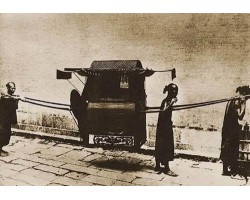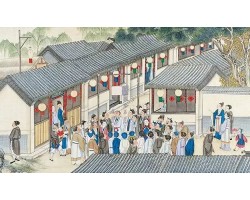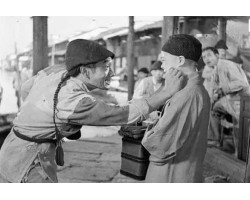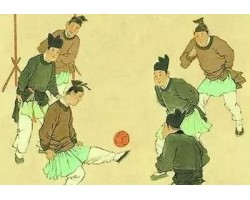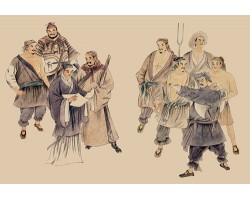Articles:
CHAPTER II (Three Years in Western China)
CHAPTER II.CH'UNG-K'ING TO THE CAPITAL OF KUEI-CHOW.My overland caravan—Harvesting opium—Field-fishing—Wood-oil—The manufacture of paper—Salt carriers—Silk-worms and their food—Rice or Pith paper, and its manufacture—The Kuei-chow frontier—Minerals—First meeting with Miao-Tzŭ—Poetical description of Chinese inns—T'ung-tzŭ, its poppy valley and tunnelling—Ingenious bamboo water-wheels—Scant population amid ruins of fine houses—Coal-dust as fuel—The Wu Chiang river—Destruction of the iron suspension bridge—Northern Kuei-chow, a Miao-tzŭ graveyard—Opium-sodden inhabitants—The capital of the Provi...
- 0
- |
- 557
- |
- 2023-01-21
CHAPTER 1 (The Story of the Stone-translated by David Hawkes)
CHAPTER 1Zhen Shi-yin makes the Stone's acquaintance in a dreamAnd Jia Yu-cun finds that poverty is not incompatible with romantic feelingGENTLE READER,What, you may ask, was the origin of this book?Though the answer to this question may at first seem to border on the absurd, reflection will show that there is a good deal more in it than meets the eye. Long ago, when the goddess Nǚ-wa was repairing the sky, she melted down a great quantity of rock and, on the Incredible Crags of the Great Fable Mountains, moulded the amalgam into thirty-six thousand, five hundred and one large buil...
- 0
- |
- 394
- |
- 2023-01-19
Chapter 3 (The Story of Ah-Q) A Further Account of Ah-Q's Victories
The True Story of Ah-Q Chapter 3: A Further Account of Ah-Q's Victories Although Ah Q was always gaining victories, it was only after he was favoured with a slap on the face by Mr. Chao that he became famous. After paying the bailiff two hundred cash he lay down angrily. Later he said to himself, "What is the world coming to nowadays, with sons beating their parents…" Then the thought of the prestige of Mr. Chao, who was now his son, gradually raised his spirits, and he got up and went to the wine shop singing The Young Widow at Her Husband's Grave. At that time he did feel that...
- 0
- |
- 427
- |
- 2023-01-19
Chapter 2 (The Story of Ah-Q) A Brief Account of Ah-Q's Victories
The True Story of Ah-Q Chapter 2: A Brief Account of Ah-Q's Victories In addition to the uncertainty regarding Ah Q's surname, personal name, and place of origin, there is even some uncertainty regarding his "background." This is because the people of Weichuang only made use of his services or treated him as a laughing-stock, without ever paying the slightest attention to his "background." Ah Q himself remained silent on this subject, except that when quarrelling with someone he might glance at him and say, "We used to be much better off than you! Who do you think you are anywa...
- 0
- |
- 451
- |
- 2023-01-19
The Outlaws of the Marsh Chapter 2 Arms Instructor Wang Goes Secretly to Yanan Prefecture
Chapter 2Arms Instructor Wang Goes Secretly to Yanan PrefectureNine Dragons Shi Jin Wreaks Havoc in Shi Family VillageDuring the reign of Emperor Zhe Zong, who ruled a long time after Ren Zong, in Bianliang the Eastern Capital, in Kaifeng Prefecture previously called Xuanwu District, there lived a young scamp named Gao. A second son, he was quite useless. He cared only for jousting with spear and staff, and was an excellent football player. People in the capital were fond of making quips. They dubbed him Gao Qiu, or "Gao the Ball." Later, when he prospered, he changed "Qiu" to another characte...
- 0
- |
- 435
- |
- 2023-01-18
The Outlaws of the Marsh Chapter 1 Zhang the Divine Teacher Prays to Dispel a Plague
Chapter 1Zhang the Divine Teacher Prays to Dispel a PlagueMarshal Hong Releases Demons by MistakeAfter Five Dynasties' turmoil and strife,The clouds dispersed and revealed the sky,Refreshing rain brought old trees new life, Culture and learning once again were high.Ordinary folk in the lanes wore silk,Music drifted from mansions and towers,Under the heavens all was serene,Men dozed off at noon midst gay birds and flowers.This eight-lined poem was written during the reign of Emperor Shen Zong of the Song Dynasty by a scholar named Shao Yaofu, also known as Master Kang Jie. From the end of the T...
- 0
- |
- 447
- |
- 2023-01-18
